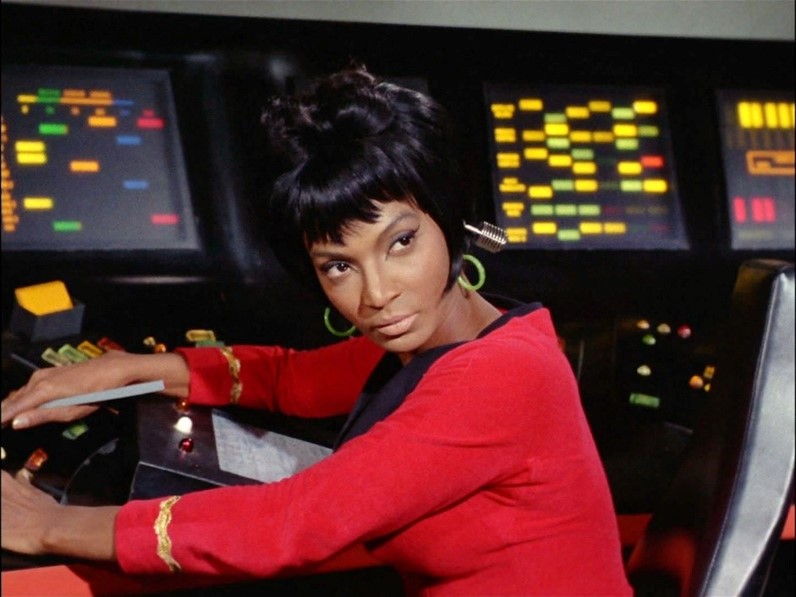
To listen to this reflection as a podcast, click here.
Last summer, the world of entertainment lost a pioneer.
Nichelle Nichols, who died in July at the age of 89, was one of the original cast members of NBC’s Star Trek, Gene Roddenberry’s prime time outer space adventure series.
What amazed viewers were the officers on the bridge of the starship Enterprise. Aside from Captain Kirk, there was Spock (half-human and half-Vulcan); Sulu (an Asian); Chekov (a Russian, in the middle of the Cold War, no less); and Lt. Nyota Uhura, the black female communications officer. Roddenberry’s vision of the future was one in which a working team might be assembled without regard to gender, nationality, or ethnicity.
Singer and actress Nichols, who played Uhura, was the first African American, male or female, ever to assume a continuing role on a TV show that was predicated on equality with the white cast members.
After the first season of the show, Nichols was ready to resume her career on Broadway. She submitted her resignation to Roddenberry on a Friday afternoon. Deeply disappointed, he refused to accept it, and asked her to mull things over for a few days.
That weekend she attended a celebrity gala for civil rights leaders in Los Angeles sponsored by the NAACP. During the course of the event one of the coordinators approached her with the news that her “greatest fan” was hoping to meet her. Great, thought Nichols. Some adolescent Trekkie had managed to crash the party.
She later wrote, “I looked across the room, and there was Dr. Martin Luther King walking towards me with this big grin on his face. He reached out to me and said, ‘Yes, Ms. Nichols, I am your greatest fan!'”
Dr. King revealed that Star Trek was the only TV show that he and Coretta allowed their three young children to stay up and watch. They never missed an episode.
And it was all because of her.
Nichols expressed her thanks, then remarked almost casually that she had tendered her resignation only 24 hours earlier. Before she even had a chance to provide an explanation, King cut her off. “You can’t leave the show. You’re part of history.” The civil rights leader went on to explain that Star Trek represented a significant social breakthrough. The show had imagined the future, “and we are there. We are there because you are there.” A black woman was fourth in command of a starship.
King went on to tell Nichols that this was the very thing he was marching for. She was playing a vital role on behalf of black children – of all children, in fact – as they pictured the kind of ideal world they hoped one day to inherit.
The rest of her weekend was a mess. She vacillated between sadness and anger. What right did Martin Luther King Jr. have to tell her what she ought to do?
By Monday morning she had come to the realization that she had been given an incredible opportunity. She asked Roddenberry to tear up her resignation. In truth, he had already done it. When she told him what King had said, the producer cried.
Nichols not only remained on the show through its third and final season (becoming Commander Uhura along the way) but starred in the first six Star Trek feature films. Scientists have named an asteroid in her honor. From 1977 to 2015 she served as a volunteer promoter for NASA, helping recruit some of the first female and ethnic minority astronauts.
Is it possible to imagine a different kind of future?
Here’s how the Bible’s last book portrays heaven: “A great multitude that no one could number, from every nation, from all tribes and peoples and languages, stood before the throne and before the Lamb…” (Revelation 7:9).
It always broke Dr. King’s heart that so many church leaders couldn’t or wouldn’t embrace that vision during his brief 14-year stint (1954-1968) as the focal point of America’s civil rights movement. Perhaps they suspected that social unity and ethnic diversity would somehow threaten God’s kingdom.
But God has planned a party to which everyone is invited. Even you and me.
King declared, “If you can’t fly, then run. If you can’t run, then walk. If you can’t walk, then crawl. But whatever you do, you have to keep moving forward.”
If we keep moving forward, we, too, can make history.
We can help our world boldly go where God is surely calling us to go.
